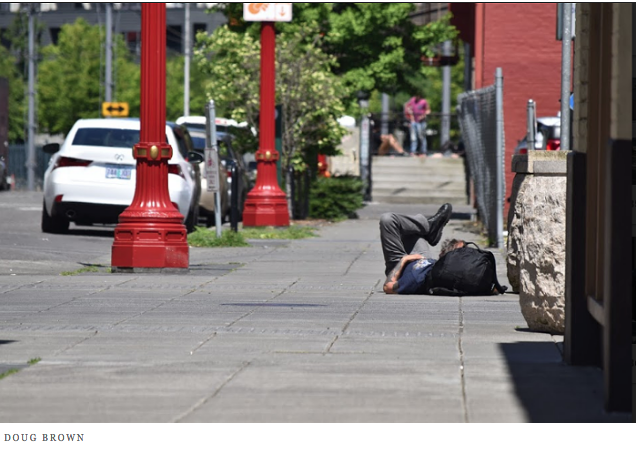
Plans to create what could be Portland's largest permanent homeless shelter are pressing forward, despite neighborhood opposition and a city commitment to not expand social services in Old Town.
On November 20, architects representing Multnomah County filed an application [PDF] with the city's code-enforcement office, asking for early assistance as the county works toward building a 200-bed shelter in an abandoned warehouse at 320 NW Hoyt.
The application, filed by Carleton Hart Architecture, is essentially a request for the city to answer detailed zoning questions before the project moves forward. Included are queries about whether portions of the zoning code can be waived under Portland's ongoing housing emergency declaration, and what type of review is required.
But the county also has a more interesting question, too: It wants assurances from the city that the new 200-bed shelter won't run afoul of the city's planning goals.
As the Mercury reported in September, the city has for decades committed to a "no-net gain" policy in Old Town. Though the commitment has taken different forms, its central tenet has remained the same: Portland officials have said they will not meaningfully increase social services offerings in Old Town, which has long held more than its fair share of shelters, single-room occupancy buildings, and meal services for the destitute.
Current language in the city's Central City Plan states that the city will "limit the significant expansion of these services and do not locate additional major social services in the district." Obviously, the addition of 200 new shelter beds could compromise that commitment. County officials are arguing it shouldn't.
Picking up a line of reasoning voiced earlier this year by Mayor Ted Wheeler's office, the county says the recent relocation of homeless services in the district has created room. Earlier this year self-managed homeless rest area Right 2 Dream Too, which took in roughly 70 people a night, relocated across the river. Meanwhile the Royal Palm Hotel, comprised of roughly 50 beds of transitional housing and dormitory living, has closed.
Now Multnomah County is including another Old Town social service in the deal. According to the documents filed with the city, a 75-bed women's shelter in the neighborhood, known as the Safety Off the Streets shelter, would be closed, and its beds would be folded into the new Hoyt Street facility.
"The new shelter will compensate for the loss of shelter beds in the neighborhood and will not significantly expand social service and shelter functions in the district," the county's application says. "Can you confirm or comment on these assumptions?"
Even if the city okay's the county's reasoning, it's unlikely Old Town stakeholders will. The Old Town Chinatown Community Association sent a letter to city and county officials in September, arguing a new shelter would hurt the neighborhood businesses, make it less safe, and run afoul of the city's promises.
"Locating the City’s largest permanent shelter in Old Town Chinatown will have a long-term, detrimental economic impact to the neighborhood," part of the letter read, "and counteract efforts by the City and private entities to revitalize the district."
It's unclear when—or even if—the new shelter might spring up in Old Town. Though the county's Joint Office of Homeless Services (JOHS) has not been shy about insisting a new facility is necessary and could be beneficial to the neighborhood, the county's been wrapped up in negotiations over leasing the property for months.
"This is moving; this is going down the road," says JOHS spokesperson Denis Theriault."Part of the reason to go for the pre-app now is: Before we go for anything down the road, let's see what the city is going to require. Let's get the bad things out of the way."















